BRUSSELS, June 30 — Hungary has officially vetoed the opening of formal negotiations for Ukraine’s accession to the European Union, using the unanimity rule that requires consent from all member states. Prime Minister Viktor Orbán cited the results of a recent advisory referendum, where the majority of Hungarian voters opposed backing Ukraine’s EU membership, as justification for the move, according to the European Council.
This marks the latest chapter in Hungary’s long-standing resistance to Ukraine’s EU integration, which Warsaw and Brussels view as a critical step in supporting Kyiv amid Russia’s ongoing invasion.
Political motives behind Hungary’s veto
While Budapest officially frames its veto as protection of the Hungarian minority rights in Ukraine’s Zakarpattia region, deeper political motives appear at play. Orbán, known for his pro-Russian stance and close Kremlin ties, is increasingly seen as a “Trojan horse” within the EU, undermining the bloc’s unity and its coordinated support for Ukraine.
Observers note that Hungary’s actions weaken the European Union’s cohesion at a moment when solidarity is vital to counter Russian aggression. The veto fuels concerns about rising euroscepticism and democratic backsliding under Orbán’s government.
Calls for reforming EU decision-making
Experts and some EU officials argue that Hungary’s veto highlights a critical flaw in the EU’s foreign policy decision-making framework, which still relies on unanimity for sensitive issues like enlargement and security policy.
“There is an urgent need to shift to qualified majority voting in external relations to prevent single states from blocking consensus on key strategic matters,” said a European diplomat familiar with the accession process. Such a change could accelerate Ukraine’s integration and strengthen the EU’s global role.
Impact on EU unity and Ukraine’s future
Hungary’s blockade risks fragmenting EU cohesion and undermining the bloc’s credibility as a community of democratic states committed to human rights and rule of law. The move also signals Budapest’s gradual departure from European democratic norms, raising alarms about the influence of authoritarian tendencies within the union.
Orbán’s stance not only contradicts the broader European commitment to supporting Ukraine’s sovereignty but also positions Hungary increasingly at odds with EU principles. Critics accuse Orbán of prioritizing Kremlin loyalty over European values and solidarity with Ukraine.
By exploiting veto power as a political tool, Hungary jeopardizes both the pace of Ukraine’s European integration and the security architecture of the continent.
Context of Ukraine’s EU ambitions
Ukraine’s bid to join the EU gained momentum following its 2022 Russian invasion, which galvanized widespread European support. The accession talks represent a pivotal step in Kyiv’s efforts to deepen ties with the West, fostering economic, political, and security cooperation.
However, the unanimity requirement for all member states to approve the opening of accession negotiations gives individual countries disproportionate leverage to stall the process. Hungary’s veto exposes this vulnerability and intensifies debates over reforming EU enlargement policy to better reflect strategic realities.










